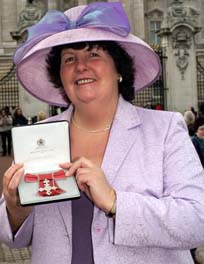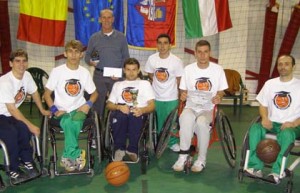CLUJ-NAPOCA, Romania | As the little white table-tennis ball rolls on the floor, Dacian Mackszin leans on the side of his wheelchair to drag the ball closer to him with his racket. With a difficult but deft move, he collects the ball and returns swiftly to his side of the table, waiting for his opponent, Petru Ifrosa, to begin a new game.
Mackszin and Ifrosa practice table tennis for several hours every day at Cluj’s Lamont Center, which serves adults with physical disabilities and sponsors them in various sports. The center has been hailed as the first of its kind in Romania. Mackszin and Ifrosa have dominated their sport in Romania for the past few years, competing with other disabled players and often training with non-disabled people as well. After entering and winning numerous competitions, Mackszin and Ifrosa have their eyes set on the Paralympics in London in 2012.

Founded in 2000 by Sally Wood-Lamont, a native of Scotland, the center is unusual in Romania for the facilities and care it provides.
In sharp contrast to the isolated lives they led before joining the Lamont Center, the two men, both 27, say they are having a good time – and they are beaming with self-confidence.
“I got rid of a monotonous and lonely life inside the house,” says Ifrosa, who came to Cluj from a town in the northern region of Moldavia.
Struck by polio at the age of nine months, following an incorrectly administered vaccine, Mackszin became a paraplegic and also developed lumbar scoliosis, or curvature of the spine. During the first years of his life he had no wheelchair, so he had to either crawl on the floor or have someone carry him around the house. As his condition shamed and burdened the family, he was placed in an orphanage in Jucu, a small village near Cluj, at the age of six. Since then, he has seen his mother only twice, the last time almost two decades ago.
For years, Mackszin says, he envisaged his adult life in utter poverty and humiliation. “I felt somewhat protected at the orphanage, but at the same time I was terrified, wondering what would happen with me at the age of 18, when they would kick me out of there,” he says.
Then, for Mackszin, Ifrosa, and 43 other disabled people, the Lamont Center became a life-changer. Founded in 2000 by Sally Wood-Lamont, a native of Scotland, the center is unusual in Romania for the facilities and care it provides. It offers everything from therapy sessions to sports, arts and crafts to sewing, English classes to computer instruction. The members have no financial obligations; they just have to show up regularly, behave, and engage in some of the activities.
Benchwarmers No More
Wood-Lamont first visited Romania in 1991 as an employee of the Edinburgh University Library. At the time, she admits, she knew nothing of this country, other than the fact that Bucharest is the capital city. After several other visits, however, she fell in love with Romania and decided to move here. Among her activities in her new home, Wood-Lamont taught English with an organization that works with disabled people. She was so moved by the plight of Romania’s disabled population that she became determined to do something to help them.
“In Romania, there’s still a very strong stigma associated with people with physical disabilities,” Wood-Lamont says. “They mostly live a life of isolation and shame, because the non-disabled don’t really want anything to do with them.”
Wood-Lamont says she is particularly disappointed, and even angry at times, when she hears that some Romanians consider physical disabilities to be “pay-up time for the sins of the family.” They don’t understand, she says, disabilities can affect anyone.
With the money she inherited from a late uncle in Scotland, Wood-Lamont bought the land where the center stands today in 1999. When she opened the facility the following year, she introduced an emphasis on sports, which she considers to be the fastest and surest way for the disabled to gain self-confidence and to integrate with others.
“Sports is a brand for your country,” Wood-Lamont says. “If Romania is known world-wide for its players and athletes, why not be known for athletes with disabilities as well?”
The Lamont Center’s table tennis team started training in 2002. Coaching them was Anca Chereches, a former professional table tennis player. The team won medals in national competitions and soon began participating in events abroad, despite the fact that it received no financial support from the Romanian Federation of Sports for People with Disabilities (FRSPH). The federation only sponsors players participating in European championships or in the Paralympics, which are held in the same years at the Olympics.
“This does not make any sense. How can they expect anyone to qualify for those competitions if they don’t participate in many other events before, to collect points?” asks Wood-Lamont, referring to the players’ need to amass points from competition victories in order to qualify for more prestigious events. Wood-Lamont had to cover competition costs on many occasions – up to 1,000 euros per player at a time. This October, she even had to step in and cover the expenses for the European Championships in Kranjska Gora, Slovenia, because the FRSPH had run out of funds and was unable to help. The money comes from various grants and individual donations, which the Lamont Center receives for its overall activities.
This year alone, Mackszin and Ifrosa took part in four competitions abroad and did very well, but they fell short of qualifying for next year’s Paralympics in Beijing because they could not participate in more events and collect more points.
Exorbitant costs, however, have not scared Wood-Lamont away from organizing a far-reaching sports event, the Romanian International Table Tennis Open for People with Disabilities. With a 50,000-euro sponsorship from the FRSPH and the Romanian National Association of Sport, Wood-Lamont staged an event for 105 players from 16 countries in Cluj in May. Maria Milea, the secretary-general of FRSPH, says the financial aid for this competition was extraordinary and most likely a one-time occurrence. Because 2007 has been the European Year of Equal Opportunities, a program sponsored by the European Union, Romanian institutions – including the government – have been more sensitive towards the issues of the disabled than they usually are.
The competition was such a success that participants are hoping it will become an annual event. Next year it will be held in June, just before the Paralympics in Beijing, and it will have a special significance: it likely will decide the ranking of the players for the draw in China.
Hurdles to Clear
For Mackszin, 2007 brought an opportunity he never dared to dream about as he was growing up: he started university, enrolling in day classes at the School of Public Administration at Babes-Bolyai University in Cluj He is the sixth Lamont Center member to go to college, on scholarships received from the Edinburgh branch of the Soroptimist Foundation, an international volunteer organization for business and professional women.
Like in most everyday situations, Mackszin needs his friend Robi Otvos to help him around the university building because there are no elevators or ramps. Although national law requires new buildings to provide wheelchair access, this isn’t the reality in Cluj or in many other places in Romania. “They are building ski-slopes, not ramps,” Wood-Lamont says of Romanian public and private institutions. “They don’t understand that a person in a wheelchair needs to be able to move around by themselves, not be pushed at all times.”
Mackszin has learned to cope with these frustrations, although he says he cannot count the times he had to turn around from shop windows and even church doors because there was no way for him to go inside. Wherever he needs to be, he is almost always accompanied by Ifrosa, who walks with crutches, and Otvos, who has a less severe disability and walks on his own.
Traveling back and forth to the Lamont Center every day can be a challenge in itself. “Many people think we are beggars, and they give us a mean look,” Otvos says. “But even worse [are] those who understand that we have a problem, but they simply do not care – like the bus drivers, when they see us at the bus stop but they don’t pull over where we are so that we can take Dacian’s chair up as well. They keep going, and then we have to ‘run’ after them.”
The three friends live together at a house Wood-Lamont found for them, and they manage everything at home by themselves. Wood- Lamont pays the rent and utilities, but the friends have to buy and prepare their food and take care of everything around the house from their own income – monthly state support traditionally of about 50 euros per person.
Both Mackszin and Ifrosa – who will graduate from university in 2008 – hope that in the future, they will have jobs and be completely self-sufficient. In theory, this is possible, because a 2006 law requires that every Romanian company with more than 50 employees must hire a small percentage of disabled people. In practice, however, this is very rarely the case.

The Lamont Center has helped young athletes overcome traditional stereotypes in Romania. Photo by Sinziana Demian.
The players say they would love to participate in international basketball competitions as well, but for now that is still a step too high to climb. Their chair models, which are only suitable for basic movement, are not accepted on basketball courts outside Romania. Special chairs can cost up to 4,000 euros each, a prohibitive sum for the center for the time being.Over the last year-and-a-half, the three young men and some of their colleagues at the Lamont Center put together a wheelchair basketball team and asked John McDaniels, an American former high school coach who lives in Cluj, to take charge. They quickly became number one wheelchair basketball team in the country – there are five in total – before dropping to the third place this year after several team reshuffles and a handful of games they lost by only a few points.
But Wood-Lamont says she will keep aiming high. And for her lofty, tireless efforts, Wood-Lamont received The Most Excellent Order of the British Empire from Queen Elizabeth II in 2002 “for services to young people and the disabled in Romania.” Her next project, she says, is to build a Center for Sports Excellence in Cluj. The center will be a joint endeavor with Katie Rizvi of the Little People Foundation, which assists people with a variety of physical challenges. Rizvi has trained volunteers for more than a decade in Romania, working most often with cancer patients. She says she sees similarities between the situations of cancer patients and those of the disabled; both need support networks and sustained activities to be able to participate in society.
“It is amazing to see how these people have changed since they started doing sports,” Wood-Lamont says of her center’s participants. “They became ambitious and motivated and started seeing, for the first time in their lives, what they are worth and what they can achieve.”
Tags: Disabilities
